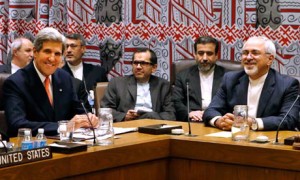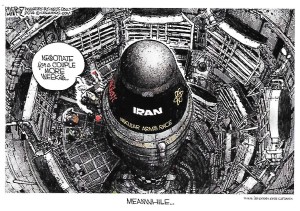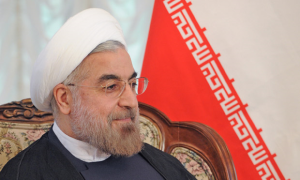“We have never pursued or sought a nuclear bomb and we are not going to do so. We are solely seeking peaceful nuclear technology.” – Iranian President Hassan Rouhani, September 2013.
Two months later, as Iran agreed to rollback parts of its nuclear program in exchange for relief from some sanctions, President Obama assured us he wouldn’t allow and interim agreement to become a means for Tehran to play for time in the development of a nuclear weapon. If Iran does not fully meet its commitment during this six-month phase,” he said, “we will turn off the relief (from sanctions) and ratchet up the pressure.
It reminds one of when he said “the movement of chemical weapons in Syria would cross a red line for us and might trigger a military response.”
During his State of the Union address last night President Obama threatened to veto any attempt by Congress to impose new sanctions on Iran until he can assess the new reconciliatory tone emanating from Tehran.

Why are these men smiling? After round after round of negotiations, the delays have enabled Iran to continue its nuclear weapons program, causing Iran’s Foreign Minister Mohammad Javad Zarif (right) to smile.
The Obama administration believes “A sanctions bill would be interpreted as a hostile act by Tehran … spoiling the diplomatic mood,” reports the Wall Street Journal. But Congressional action would only penalize Iran if they didn’t come to terms. Its passage would serve to inform Iran that they will pay a price for continued delays.
Congress, including a number of Democrats, are concerned with reports that U.S. negotiators would devolve from an outright stopping of Iran’s nuclear program to a lesser demand that would provide Iran with a window of perhaps a year to develop a bomb. The desire to get a deal for deal’s sake – a bad deal – is what concerns many, especially Israel.







